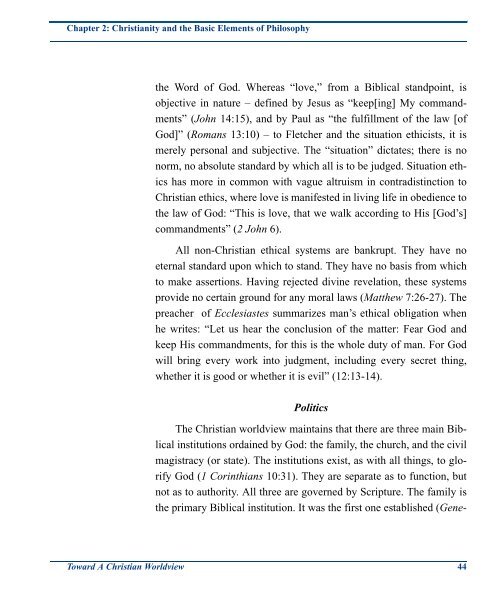Toward A Christian Worldview - Faith Presbyterian Church Reformed
Toward A Christian Worldview - Faith Presbyterian Church Reformed
Toward A Christian Worldview - Faith Presbyterian Church Reformed
You also want an ePaper? Increase the reach of your titles
YUMPU automatically turns print PDFs into web optimized ePapers that Google loves.
Chapter 2: <strong>Christian</strong>ity and the Basic Elements of Philosophy<br />
the Word of God. Whereas “love,” from a Biblical standpoint, is<br />
objective in nature – defined by Jesus as “keep[ing] My commandments”<br />
(John 14:15), and by Paul as “the fulfillment of the law [of<br />
God]” (Romans 13:10) – to Fletcher and the situation ethicists, it is<br />
merely personal and subjective. The “situation” dictates; there is no<br />
norm, no absolute standard by which all is to be judged. Situation ethics<br />
has more in common with vague altruism in contradistinction to<br />
<strong>Christian</strong> ethics, where love is manifested in living life in obedience to<br />
the law of God: “This is love, that we walk according to His [God’s]<br />
commandments” (2 John 6).<br />
All non-<strong>Christian</strong> ethical systems are bankrupt. They have no<br />
eternal standard upon which to stand. They have no basis from which<br />
to make assertions. Having rejected divine revelation, these systems<br />
provide no certain ground for any moral laws (Matthew 7:26-27). The<br />
preacher of Ecclesiastes summarizes man’s ethical obligation when<br />
he writes: “Let us hear the conclusion of the matter: Fear God and<br />
keep His commandments, for this is the whole duty of man. For God<br />
will bring every work into judgment, including every secret thing,<br />
whether it is good or whether it is evil” (12:13-14).<br />
Politics<br />
The <strong>Christian</strong> worldview maintains that there are three main Biblical<br />
institutions ordained by God: the family, the church, and the civil<br />
magistracy (or state). The institutions exist, as with all things, to glorify<br />
God (1 Corinthians 10:31). They are separate as to function, but<br />
not as to authority. All three are governed by Scripture. The family is<br />
the primary Biblical institution. It was the first one established (Gene-<br />
<strong>Toward</strong> A <strong>Christian</strong> <strong>Worldview</strong> 44


